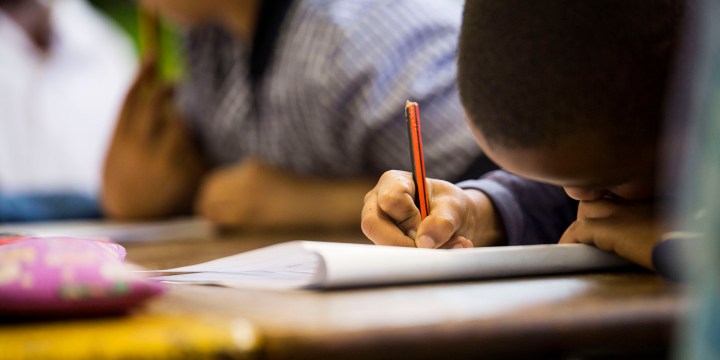MAVERICK CITIZEN OP-ED
We must do more for the education of the very young during the Covid-19 crisis

Earlier this year, there was shock at the news that 31,000 pupils failed Grade One in 2018. Even more shocking was the fact that this was for Gauteng alone.
At the time, a lot of noise was made about the high failure rate among first graders, and rightfully so. Amid some of this noise, there was a fair amount of blaming – blaming teachers, blaming schools, blaming the curriculum. And maybe, to some extent, these factors are to blame.
But we also know from research that the first 1,000 days of a child’s life are crucial in ensuring that children are well-developed and school-ready. If a child is failing in the first grade, it’s obvious the school could be partly responsible. However, more often than not, we have to look at their preschool or Early Childhood Development (ECD) stage. The single most important factor in any child’s early development stage is the parents or primary caregiver.
We live in a country where many children at preschool level depend primarily on creches and ECD centres as their primary source of stimulation for development. We already know from research that many children from black families do not receive enough stimulation at home. Research by Stats SA found that one in three children were never encouraged to imitate daily activities and more than a third of parents did not answer questions asked by their children. Nearly half of South African parents or guardians have never read a book to their child or drawn with them.
These are things that are crucial for the development of a child, especially at an ECD stage.
Since schools and ECD centres closed, these children now depend entirely on their parents and the home environment to provide 100% of the stimulation they need to continue with their development and learning. There have been commendable efforts to make learning resources available to parents and children during the lockdown, but these resources are online.
We know there is still a large portion of our nation that lacks access to material that is online. Without some kind of resource or help, it’s unlikely that parents will now be able to provide the kind of stimulation or learning environment that their children need. Learning and education cannot be denied to children of the poor simply because we are in a crisis.
Of course, in these times making sure that people are safe and have food, soap and water is the top priority. But it should also be a priority to make sure that none of our children in poor communities is left behind in terms of education.
There is a Gogo Dlamini in a rural area somewhere in this country who is taking care of her three grandchildren aged between three and eight. She is the only adult in the household and she doesn’t have a smartphone. In our efforts to make sure that the children in this country continue learning, we must find a way to not leave Gogo Dlamini and her grandchildren behind.
We need to find a way to let the country’s Gogo Dlaminis know what is needed for their grandchildren. If we can do that, the children just starting out stand a far better chance of making it through Grade One. DM/MC
Mamaponya Motsai is the knowledge management officer at Seriti Institute where she runs a project aimed at helping primary caregivers play a bigger role in stimulating their children for maximum development at ECD level.
"Information pertaining to Covid-19, vaccines, how to control the spread of the virus and potential treatments is ever-changing. Under the South African Disaster Management Act Regulation 11(5)(c) it is prohibited to publish information through any medium with the intention to deceive people on government measures to address COVID-19. We are therefore disabling the comment section on this article in order to protect both the commenting member and ourselves from potential liability. Should you have additional information that you think we should know, please email [email protected]"



 Become an Insider
Become an Insider